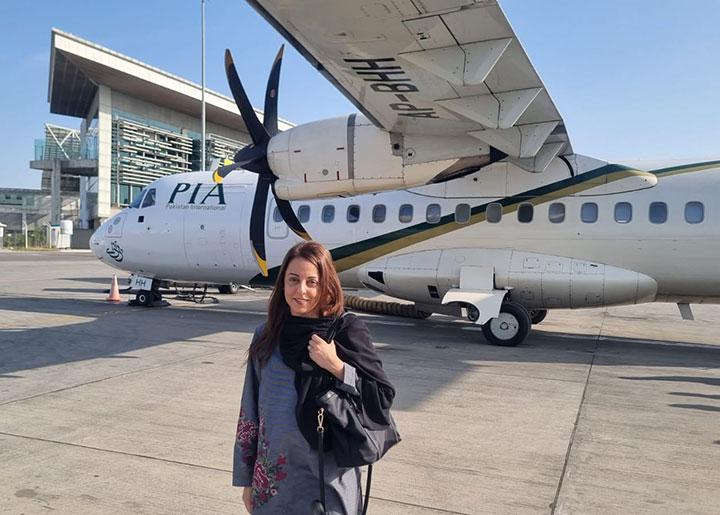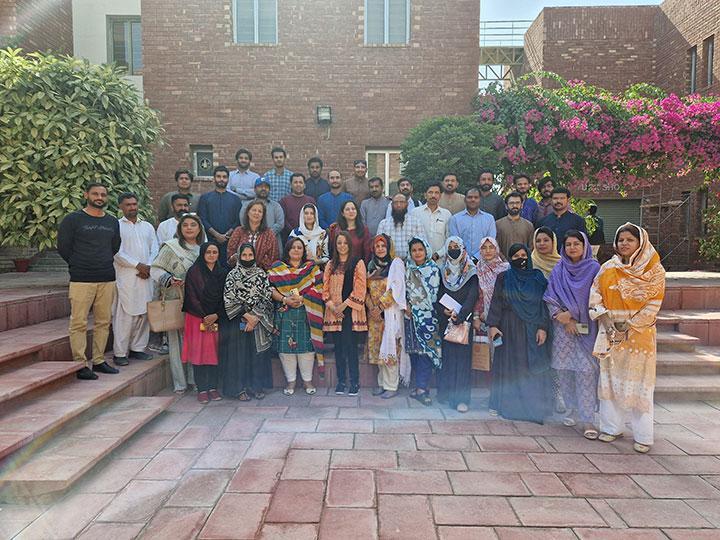Academic Profile - Dr Samina Karim
Addressing challenges for social workers in Pakistan and the UK
Dr Samina Karim, Associate Professor in the School of Social Sciences and Department of Social Work has recently completed a project working with UNICEF to ensure there are enough fully trained social workers in Southern Pakistan to ensure children’s safety following the devastating floods of summer 2022.
Can you give an overview of the UNICEF project?
I was engaged as an international consultant on child protection case management, which sounds grand, but I was part of a larger team with colleagues from UNICEF doing the planning, recruitment, logistics, the online setup, etc. I was contracted for 60 days in total between January and April 2023 for a very specific purpose - to assess the needs of the newly recruited workforce and create and deliver a bespoke package of training.
The floods in Pakistan in June 2022 really brought the shortage of appropriately qualified and experienced social workers in Pakistan to light, as many thousands of people have been displaced leading to a crisis situation. The government recognised the need for help, particularly in the Sindh province (in Southern Pakistan) and UNICEF stepped in to inject some resource into the child protection system.

Dr Samina Karim arriving for the UNICEF project at Sukkur airport in Sindh province, Pakistan.
I was responsible for training around 80 people from diverse backgrounds and levels of experience, who are now out to work as part of the UNICEF flood response. I delivered the training in quite remote regions of Pakistan because it needed to be in those areas where people were going to actually go out and work. I was also involved in training the trainers (managers and district coordinators), to make sure the training could be replicated and was sustainable. Topics covered through the training programme included a focus on child protection case management, mental health and psychosocial support and a range of social work approaches and methods.
It was the first time I've had to speak English and simultaneously translate in Urdu whilst delivering training, so that was interesting. I also had the opportunity to review the Child Protection Policy for the province and they assured me they will incorporate the changes I had recommended as part of their revised policy.
What did you learn, and how do you reflect on the project?
It was extremely challenging at times, and I think the moments that stretch you are the ones that certainly remain with you afterwards; I feel like the experience has definitely built up my resilience.
But in terms of learning, I was just so fortunate to be able to connect directly to people who are going to go out there and work. We talk about impact a lot in academia, sometimes it's really hard to get there, but if you build it in at the start and take these kinds of opportunities, we can join the dots more effectively.

Dr Samina Karim and a cohort of social workers training for the UNICEF flood response in Pakistan.
I completed a final evaluation of my work, and it was amazingly successful, I had 100% positive feedback. That gave me confidence that the social workers we trained who are now in those flood-affected areas are making a difference, and hopefully they will get become embedded within the statutory child protection system.
Also, being a consultant for UNICEF, created networking opportunities and means I’m closer to the structures and processes where I can potentially make a difference. I’m already having discussions about partnerships with different provinces and am hoping they can be involved in my research work.
Can you tell us about your recently published paper?
The paper is titled Power-informed practice in social work and looks at how we define and understand the exercise of power and empowerment. Empowerment is such a widely used term, but I think that there’s a duality to our work where social workers can be disempowering while they're empowering. In the paper I give examples of how power can be simultaneously limiting and productive, or in other words, good and bad at the same time. This is new in terms of Social Work theory and has implications for professional practice as we need to get better at recognising the positive and negative impact of any intervention with children, adults and communities.
What does your current project involve?
My four-year project with the UKRI (more in this article) has resumed following a pause to complete the work with UNICEF. So I've got another year and a half to work here in Pakistan and then two years back in the UK. The idea is to learn about the barriers in terms of reporting and responding to the sexual abuse of children from migrant communities, by first undertaking research in the country of origin and then apply this learning to the UK. Back in Bradford there will be lots of community engagement events and things like that, it will be a very interactive process.
For now, I need to be in Pakistan for the majority of my time to support the staff who have just been recruited. They are postdocs but it's their first research opportunities since they completed their PhD, so I need to make sure they’re comfortable being out in the field and working on the project. Part of the purpose of the Future Leaders Fellowship I am part of, is to support the growth, development and leadership of others, whilst creating a new body of knowledge which will help address current social challenges.
